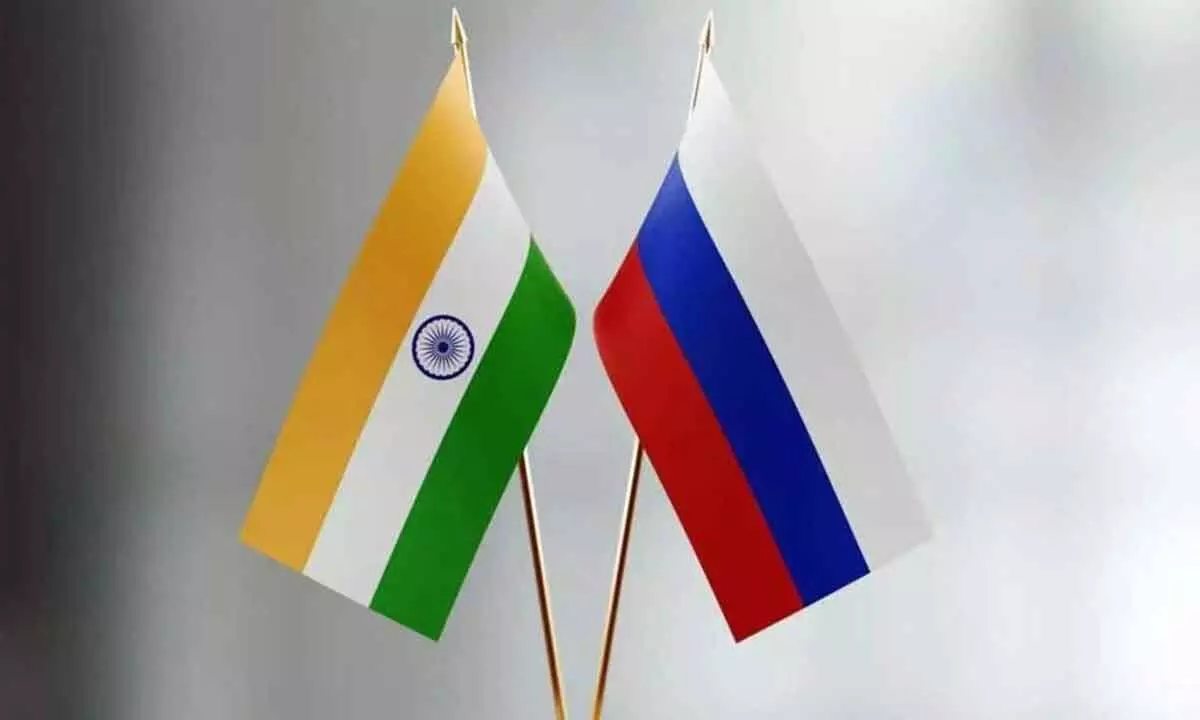India and Russia: Trade titans or temporary truce? A look ahead
India's ‘strategic ambivalence’ regarding the Russia-Ukraine war seems to be a calculated decision
image for illustrative purpose

There is a promising future ahead in terms of the trade relations between India and Russia. This evokes a positive future forward for the alliance formed between both countries, which serve as a foundation for optimism that will stand the test of time
Despite a considerable surge in various other geopolitical instabilities in the world in the last few months, it is crucial to remember that the war between Russia and Ukraine is far from over. As the conflict between the two countries approaches its second year, we shed light upon the multifaceted story of the trade relations between India and Russia during such uncertain and incalculable times. Despite a wobbly past since the collapse of the Soviet Union, India's ability to weather external instability and precariousness while maintaining robust ties with Russia even during such turbulent times reflects the symbiotic relationship between the countries and India's capacity to evolve amidst adversity.
To constrain Russia's ability to finance its war with Ukraine, finance ministers of the G7 group of nations agreed to lower the price of Russian oil and petroleum products on September 2, 2022. A restriction of $60 per barrel on the price that Russia may charge for its oil was also set by G7 in an attempt to cause potential damage to Russia while, at the same time, maintaining a stable global supply. The cap went into effect on December 5, 2022.
Regardless of the global scenario, India's ties with Russia remain distinct from a typical alliance. India's so-called "strategic ambivalence" regarding the Russia-Ukraine war seems to be a calculated decision. Amid this geopolitical upheaval, India and Russia's relationship can be more accurately described as a strategic partnership than an alliance. This results in an abstention from UN votes and avoiding a declaration of any firm stance regarding the war. Understanding these complex and intertwined interests is crucial in analyzing their unique partnership beyond traditional alliances.
Since the beginning of the war, India has emerged as one of the primary buyers of Russia's vast supply of crude oil. Despite the sanctions imposed by the USA on Russia, India now purchases nearly 1.2 million barrels of crude oil a day from Russia.
An analysis of secondary data related to the Indo-Russian trade through the Holt-Winters econometric model, particularly focusing on petroleum crude imports between 2020 and 2023, reveals that this period, marked by the unprecedented disruptions of the COVID-19 pandemic and the Russia-Ukraine war, presented a unique challenge for forecasters.
The year 2022 presented an unexpected twist in India's trade ties with Russia, as depicted in the graph. While the econometric forecasting model predicted a steady trajectory for petroleum crude imports, the graph for actual imports of petroleum crude from Russia reveals a dramatic surge, defying expectations. This major shift can be caused by the combination of the war between Russia and Ukraine and the sanctions imposed by the USA on Russian oil imports that followed.
As western nations abstained from purchasing Russian oil due to the US sanctions, it turned towards alternative means and markets by offering huge concessions on its crude oil. Thus, India saw this as a golden opportunity to capitalize upon, and it became the second-largest buyer of Russian crude, after China. This led to India getting an opportunity to save a fortune, estimated to be in billions of dollars, specifically during a term of sharply rising global oil prices due to the chaos caused by the war.
The discounted oil price wasn't just a financial boon for the country; it also helped it to maintain its energy security at a critical point when its own domestic oil production has been stagnant. The discounted Russian oil helped the country attenuate the impact of rising prices on its consumers and industries, thus potentially contributing to its economic stability.
As depicted in the graph, 2022 took the world economy by surprise. The Russia-Ukraine conflict triggered a massive surge in imports of Russian oil by India, thus pushing the actual values of imports (blue line) well over and above the model's estimates (orange line), which depicts the forecasted imports of Russian oil by India based on past data which is unaffected by the war. This can be attributed to the deducted prices offered by Russia on its crude oil.
These findings unveil a multifaceted story of India's trade relations with Russia. During a global upheaval period, this partnership's resilience and adaptability came to the forefront. More importantly, the analysis does not assert that India benefited from the Russia-Ukraine war in any shape or form. Instead, it focuses on India's strategic ability, flexibility, and the diversity of its trade balance, which has contributed to its stability during turbulent times.
There is a promising future ahead in terms of the trade relations between India and Russia. This evokes a positive future forward for the alliance formed between both countries, which serve as a foundation for optimism that will stand the test of time. At the same time, it guarantees a mutually beneficial growth and diversification potential well beyond Petroleum Oils & Crude for both countries. This potential paves the path for a greater prospect for collaboration, encompassing varying industries with aligned shared interests, resulting in ameliorated Indo-Russian trade relations.
In conclusion, we shed light on India's remarkable strength and flexibility in démarching its trade relations with Russia during a time of geopolitical upheaval.
It accentuates the enduring strength of the Indo-Russian trade alliance as a beacon of instability in turbulent times, thus leading into a new era of a symbiotic relationship between both countries.
(Aditi Raj is a final-year BA Economics (Honours) student at CHRIST (Deemed to be University), Bangalore; Dr. Taru Saigal is Assistant Professor of Economics at CHRIST)

